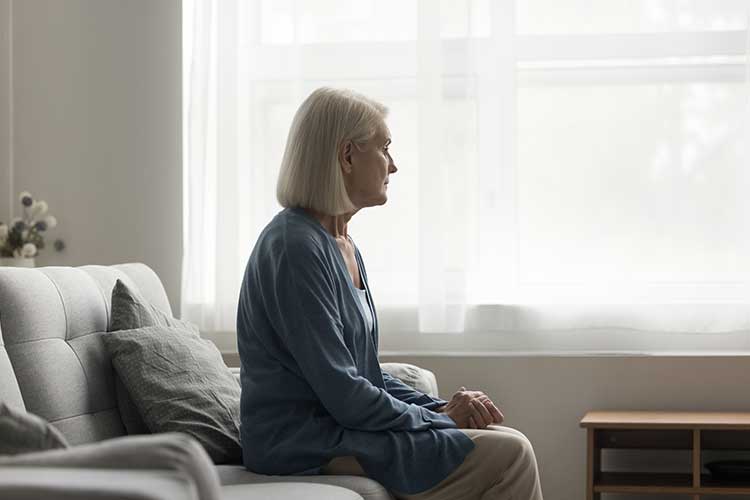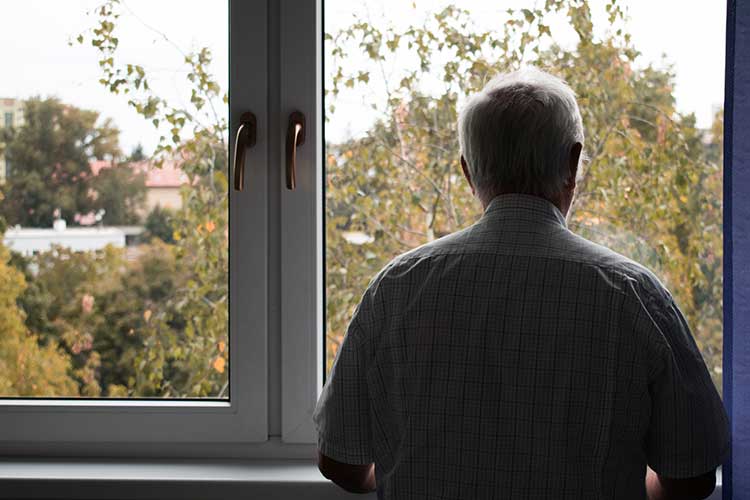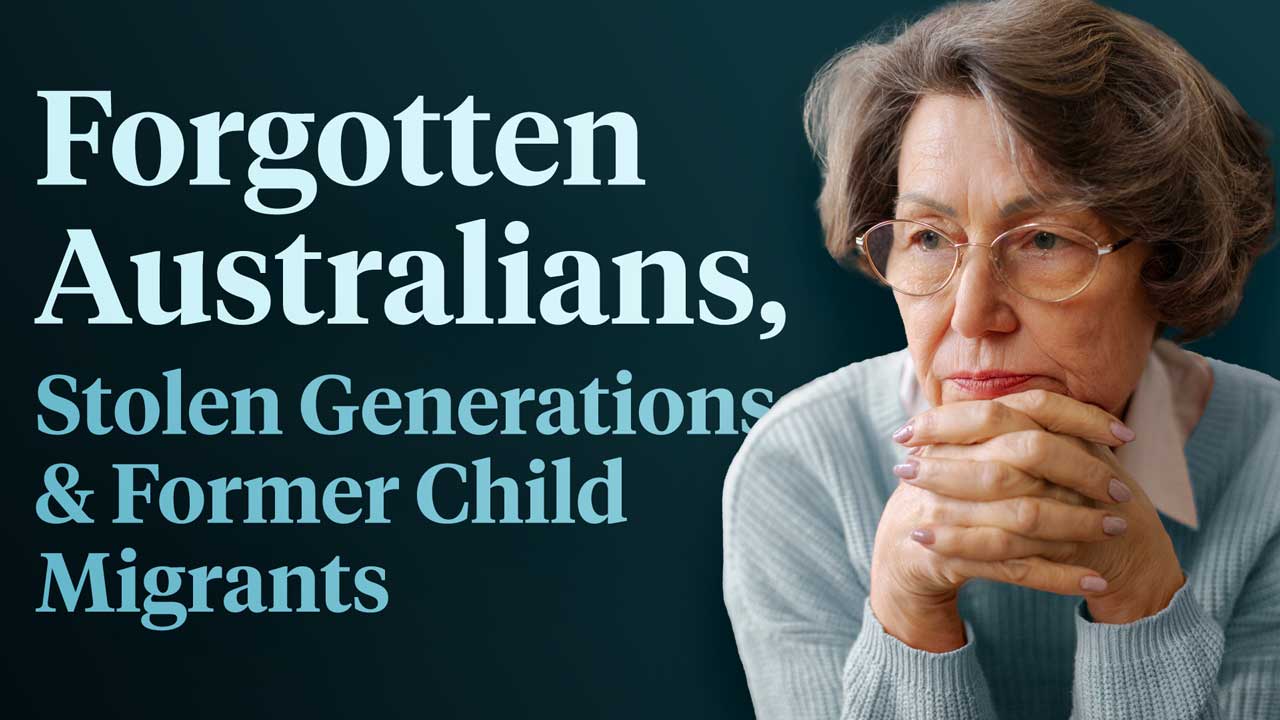Content warning: Please be aware that this Article contains information relating to child and sexual abuse, which some people may find distressing.
Who are Forgotten Australians, Stolen Generations and Former Child Migrants?
During the 20th century, about 500,000 children were forcibly taken from their families and placed into institutional or out-of-home care in Australia. These children included Forgotten Australians, Stolen Generations and Former Child Migrants (Wattle Place 2023).
The term Forgotten Australians refers to over 400,000 children who were placed into institutional or out-of-home care in Australia between the 1920s and 1980s (DoSS 2024; Britannica Kids 2020; Wattle Place 2023).
Many of these children were taken from their families without permission to live in children’s homes, orphanages, foster homes and other institutions in response to:
- The illness or death of their parent(s)
- Being born to a single parent
- Family breakdown (e.g. abuse, separation, divorce)
- Poverty
- Parents struggling to cope with their children
- A lack of adequate family support from the community and government
- Crises, such as war.
(DoSS 2024; DoHaAC 2021)
The Stolen Generations are Aboriginal and Torres Strait Islander people who were removed from their families and forced to assimilate into white culture (Britannica Kids 2020).
Former Child Migrants are the 7,000 children who were forcibly deported from the United Kingdom and Malta and brought to Australia between 1947 and the early 1970s. These children were often removed from their families without their knowledge or consent and placed into institutional care, where they were falsely told they were orphans (DoHaAC 2021).
Others were children who had been abandoned or born outside of wedlock. Almost all Former Child Migrants were from disadvantaged backgrounds (NMA 2025a).
Some cited reasons for removing these children included:
- Assisting with ‘Empire settlement’ to populate Australia with white, British-born people
- Removing British children from overcrowded institutions and teaching them farming and domestic skills.
(Wattle Place 2023)
The Impacts of Out-of-Home Care
Many of the children placed into out-of-home care experienced significant trauma.
Care institutions were often inadequately equipped to meet the children’s physical, social and educational needs, and did not provide a nurturing environment (Wattle Place 2023).
Many children were subject to extreme physical, emotional and sexual abuse where they were beaten, humiliated, punished and exploited (DoHaAC 2021).
Furthermore, many children did not receive an education and were instead forced to work, often performing demanding physical labour tasks (Wattle Place 2023; Alliance For Forgotten Australians n.d.).
Understandably, many Forgotten Australians, Stolen Generations and Former Child Migrants have experienced lasting trauma from these events. Common experiences include:
- Feelings of abandonment and loss, leading to grief, isolation, guilt, self-blame and confusion
- Grief due to being separated from their families
- Loss of identity, culture and sense of self
- Difficulty trusting and connecting with other people
- Distressing memories that may be triggered by smells, sounds, places, objects or names
- Mental illness such as depression, anxiety and personality disorders
- Heightened protectiveness of privacy and possessions due to the lack of control experienced during out-of-home care
- Homelessness or substance abuse.
(DoSS 2024; Wattle Place 2023; DoHaAC 2021)
Recognising Forgotten Australians, Stolen Generations and Former Child Migrants

It’s important to be aware that due to the stigma surrounding institutional care, many Forgotten Australians, Stolen Generations and Former Child Migrants will be reluctant to talk about their experiences, and some people haven’t even told their partners, loved ones or friends about their past (DoHaAC 2021).
Therefore, you will not always know whether someone you are caring for is part of this population. It’s important to be observant and avoid making assumptions about a person’s history. If a person seems to react to certain situations in a heightened way, this is something you can discuss with your supervisor (DoHaAC 2021).
Remember that a key principle of trauma-informed care is the underlying assumption that anyone may have experienced trauma, and acknowledging that certain behaviours could be a response to this trauma (Menschner & Maul 2016).
It emphasises the importance of adopting supportive approaches without needing to ask, screen or confirm someone’s trauma history, as asking can be re-traumatising and people often choose not to disclose their experiences (Menschner & Maul 2016).
For more information on trauma-informed care, see Ausmed’s Training Module on Culturally Safe, Trauma-Aware and Healing-Informed Care.
It’s important to keep in mind that if someone in your care does identify as a person who spent time in out-of-home care, they may prefer to describe themselves using a specific term. Some people find the term Forgotten Australians re-traumatising and prefer other labels such as ‘former state wards’, ‘care leavers’, ‘clannies’, ‘homies’ or ‘wardies’ (DoSS 2024).
Never make assumptions about a person’s preferred terminology; always ask them how they would like to be referred to.
Care Considerations
Intimate care
Forgotten Australians, Stolen Generations and Former Child Migrants who have experienced abuse might find intimate care tasks such as bathing and dressing confronting (DoHaAC 2021).
- Encourage the person to perform daily tasks independently if possible, as this may be more comfortable for them
- Mobility aids and equipment can be used to increase independence
- Respect care recipients’ gender preferences for staff members.
(DoHaAC 2021; Wattle Place 2023)
Care routines
Many Forgotten Australians, Stolen Generations and Former Child Migrants lived in tightly controlled institutional environments, with rigid schedules for eating, washing and sleeping.
Therefore, they understandably may be wary of care settings such as aged care environments, fearing they will be forced to give up independence and control over their lives (DoHaAC 2021).
You can help make care routines more comfortable by:
- Being flexible where possible
- Where feasible, including the person in decision-making and scheduling, and accommodating their choices
- Introducing enjoyable changes to routine, such as shopping trips or visits to the park.
(DoHaAC 2021)
Mealtimes
For many Forgotten Australians, Stolen Generations and Former Child Migrants, mealtimes were an unpleasant and distressing experience. There was often little variety in the food provided, with children being forced to consume cold or unappealing meals.
Due to these experiences, they may dislike eating in communal environments or refuse to eat certain foods such as porridge (DoHaAC 2021).
- If assisting someone to eat, ensure a relaxed environment, sit at eye level (if culturally appropriate) and take time to form a relationship with the person
- Serve meals that the person enjoys or that are culturally significant to them
- Be responsive to the person’s requests for food or drinks
- Respect the person’s autonomy if they do not wish to eat a meal.
(DoHaAC 2021)
Privacy and belongings
Children who were placed into institutional care often had very little privacy and were forced to sleep and bathe in communal environments. They also had few or no personal possessions apart from what was provided to them (e.g. uniforms). Therefore, they may be highly protective of their space and belongings and find situations like having their clothes communally laundered quite distressing (DoHaAC 2021).
You can help foster a sense of safety and security by:
- Allowing the person to choose whether they would prefer a single or shared room, if possible
- Involving the person in the layout of their room, if feasible (e.g. positioning of furniture)
- Ensuring the person’s privacy during dressing or bathing and having loved ones assist them if they require support with these activities
- Avoiding touching a person’s belongings without permission
- Helping the person label their clothing so it doesn't get mixed up
- Allowing the person to move about the care environment freely and safely
- Avoiding jangling keys near the person, as this may be a triggering noise.
(DoHaAC 2021)
Literacy
Many children in out-of-home care received very little education and may have low literacy skills, which can be a source of embarrassment (DoHaAC 2021). You can provide assistance by:
- Helping the person with tasks such as completing documentation or reading the newspaper
- Never rushing the person while they are completing documentation.
(DoHaAC 2021)
Culture and identity

Many Forgotten Australians, Stolen Generations and Former Child Migrants don’t know their identity and family history due to poor record-keeping, lost birth certificates or having their names changed. Some children were referred to by a number only (DoHaAC 2021; Wattle Place 2023).
Some children also became disconnected from their cultural heritage after being placed into institutional care, especially those who were unable to reunite with their families. For these reasons, Forgotten Australians, Stolen Generations and Former Child Migrants commonly experience a diminished sense of identity (DoHaAC 2021).
Celebrations
Forgotten Australians, Stolen Generations and Former Child Migrants may experience feelings of isolation or depression during events such as birthdays, holidays and family-oriented celebrations. You can help reduce feelings of isolation by inviting visitors to spend time with the person (DoHaAC 2021).
However, some people prefer not to celebrate or acknowledge these events at all, so always ask about their individual preferences (DoHaAC 2021).
Recognition and Apology
In 2008, former Prime Minister Kevin Rudd made a formal apology on behalf of Australia to Aboriginal and Torres Strait Islander people, especially the Stolen Generations, and in 2009, he formally apologised to Forgotten Australians and Former Child Migrants (NMA 2025b; DoSS 2024).
Following these apologies, the Australian Government developed several initiatives to help meet the needs of Forgotten Australians, Stolen Generations and Former Child Migrants, including but not limited to:
- Find & Connect Services, which provide a variety of services such as trauma-informed counselling, assistance with finding and accessing lost records, and family tracing
- The National Redress Scheme for people who experienced institutional child sexual abuse
- Funding for national, state and territory support services
- State and territory Stolen Generations Reparations Schemes
- National Link-Up Services for members of the Stolen Generations.
Helpful Resources
The following list outlines entities that your organisation can access to learn how to better support Forgotten Australians, Stolen Generations and Former Child Migrants in a sensitive and appropriate way:
Forgotten Australians
- The Alliance for Forgotten Australians
- Care Leavers Australasia Network (CLAN)
- Find & Connect Services
Stolen Generations
Former Child Migrants
Test Your Knowledge
Question 1 of 3
What is a recommended approach when providing intimate care to someone who has experienced out-of-home care?
Topics
Further your knowledge
 Free
Free
 Free
FreeReferences
- Alliance For Forgotten Australians n.d, About Forgotten Australians, Alliance For Forgotten Australians, viewed 23 April 2025, https://forgottenaustralians.org.au/about/forgotten-australians
- Britannica Kids 2020, Forgotten Australians, Britannica Kids, viewed 23 April 2025, https://kids.britannica.com/students/article/Forgotten-Australians/628863
- Department of Health and Aged Care 2021, Booklet – Caring for Forgotten Australians, Former Child Migrants and Stolen Generations, Australian Government, viewed 23 April 2025, https://www.health.gov.au/resources/collections/caring-for-forgotten-australians-former-child-migrants-and-stolen-generations-information-package?language=und
- Department of Social Services 2024, Forgotten Australians and Former Child Migrants, Australian Government, viewed 23 April 2025, https://www.dss.gov.au/forgotten-australians-and-former-child-migrants
- Menschner, C & Maul, A 2016, ‘Key Ingredients for Successful Trauma-Informed Care Implementation’, Advancing Trauma-Informed Care, viewed 24 April 2025, https://www.samhsa.gov/sites/default/files/programs_campaigns/childrens_mental_health/atc-whitepaper-040616.pdf
- The National Museum of Australia 2025a, National Apology to Forgotten Australians and Former Child Migrants, Australian Government, viewed 24 April 2025, https://www.nma.gov.au/defining-moments/resources/national-apology-to-forgotten-australians-and-former-child-migrants
- The National Museum of Australia 2025b, National Apology, Australian Government, viewed 24 April 2025, https://www.nma.gov.au/defining-moments/resources/national-apology
- Wattle Place 2023, Background: Forgotten Australians, Stolen Generations and Former Child Migrants, Relationships Australia New South Wales, viewed 23 April 2025, https://wattleplace.org.au/background-forgotten-australians/
 New
New 
